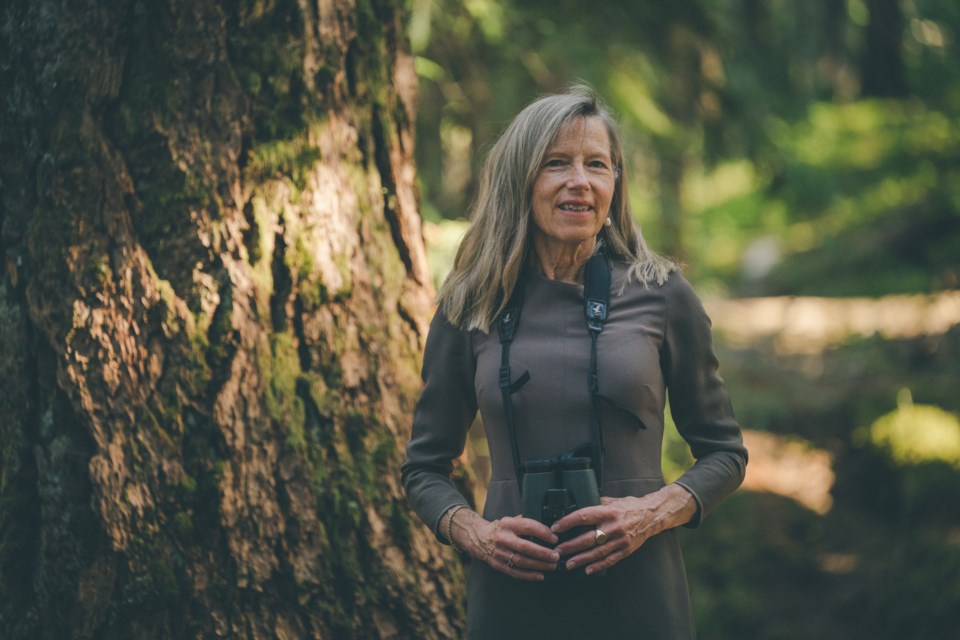With a fruitful career in the sciences under her belt, retired ecologist Rhonda Millikin plans to bring the kind of scientific rigour she has long employed to decision-making at municipal hall, if elected to council this fall.
“I feel that I’ve been involved in a few of the decision points brought to council over the last two-plus years and I would like to augment how decisions are made,” said the 66-year-old. “As a scientist, I’m curious and I like to investigate what some of the alternate solutions could be and make decisions that are evidence-based. I feel like my experience as both a scientist and an entrepreneur can widen our perspective.”
Owner of environmental consulting firm EchoTrack, Millikin is regarded for her track record in wildfire management, expertise she has used to advise the Resort Municipality of Whistler (RMOW) through her role as member at large on the RMOW’s Forests and Wildlands Advisory Committee since 2020. The work earned her a 2021 Civic Service Award from the RMOW, which recognized Millikin for her "exemplary contribution to the community” and “extensive work outside FWAC meetings to bring evidence and data to the committee through citizen science, with regards to wildfire fuel thinning and reduction.” She also serves on the board of the Association of Whistler Area Residents for the Environment.
In general, Millikin feels the RMOW too often approaches issues in isolation, and sees fire management as a prime example of an area that would benefit from a broader view.
“I think wildfire management is a perfect example of how I would like to see us approach issues, where we combine the issues. So we remove the siloes and bring together solutions,” she said. “For example, we’ve got an issue of climate mitigation, of invasive species management, we’ve got fire risk, and I feel that we can address those things together by adjusting our FireSmart program so we recognize that coastal forest is not the dry forest that the provincial [FireSmart] recommendations are based on.”
In particular, Millikin argued that Whistler should be planting herbaceous perennial plants within Whistler’s urban-wildland interface instead of cutting down trees, “which we need to protect us from heat, flooding and ignition factors of reduced humidity, increased wind, and increased risk of human-caused ignition.”
Millikin’s platform centres on lifting up what she called “the smaller voices” of Whistler: the natural environment, small business, and “community supporters” like the resort’s volunteers, tradespeople, parents and long-term residents. Typifying the holistic view Millikin tends to take, she sees Northlands—Whistler Village’s most significant remaining parcel of undeveloped land—addressing several crucial issues at once.
“If we combine the issue of affordable living with climate mitigation and community engagement, as well as small business, we can take Northlands as an example,” she said. “We have a potential to combine these issues in our search for solutions and for small business.”
The 5.8-hectare site could, for instance, provide affordable, dorm-style housing for entry-level workers, which small business owners could contribute to financially, Millikin suggested. That, in turn, would help cut back on vehicle emissions, given the site’s proximity to central services, and a scaled-down building footprint—“so no stores, no roads, no parking, no market housing,” Millikin said—would allow for more space for nature and community gathering, and would help retain and extend vital wetland and even serve as a wildlife corridor if connected to the wetlands on the west side of White Gold.
Millikin would also be in favour of relocating the Whistler Racket Club, which sits on the Northlands site, and credited management there for creating a community hub for all ages.
“That’s what we need for our community and we need it close to central so people can get together,” she said.
Sustainable tourism is another plank of Millikin’s platform. Highlighting exploding user numbers on the River of Golden Dreams, she’d like to see evidence-based thresholds placed on Whistler’s most popular natural assets to help manage demand.
“I think where I would like to help is thinking about how we manage that demand using unbiased metrics, so it’s not one person’s voice over another,” she said. “That will allow us to say, ‘Alright, we’ve reached a threshold for the carrying capacity of this natural asset,’ therefore we have to stop whatever we’re doing and we monitor the effectiveness of our efforts so we can learn whether we’re doing the right thing or if we need to tweak it.”
Follow Millikin's campaign at facebook.com/Vote-Rhonda-Millikin-105938678919794.
The nomination period closes Sept. 9. Whistlerites head to the polls on Oct. 15.





